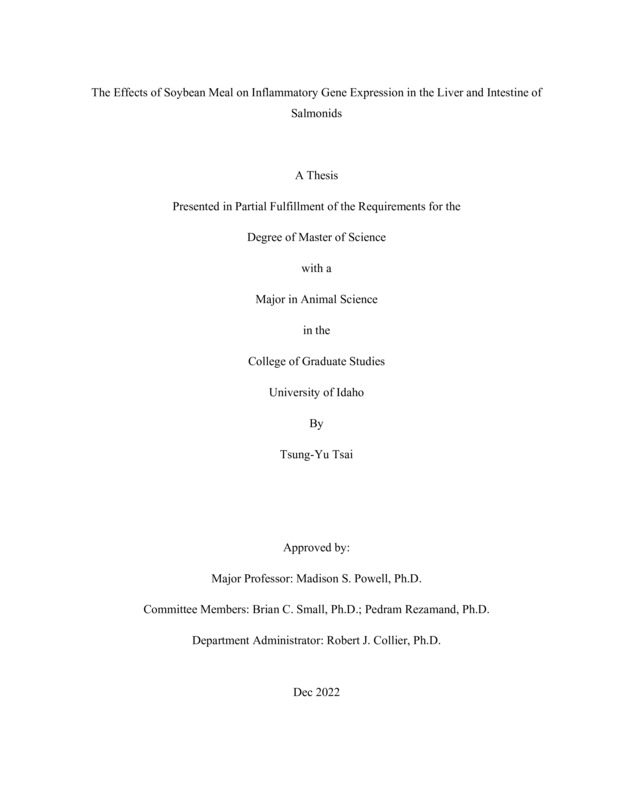The Effects of Soybean Meal on Inflammatory Gene Expression in the Liver and Intestine of Salmonids
Tsai, Tsung-Yu. (2022-12). The Effects of Soybean Meal on Inflammatory Gene Expression in the Liver and Intestine of Salmonids. Theses and Dissertations Collection, University of Idaho Library Digital Collections. https://www.lib.uidaho.edu/digital/etd/items/tsai_idaho_0089n_12246.html
- Title:
- The Effects of Soybean Meal on Inflammatory Gene Expression in the Liver and Intestine of Salmonids
- Author:
- Tsai, Tsung-Yu
- Date:
- 2022-12
- Program:
- Animal, Vet & Food Sciences
- Subject Category:
- Aquatic sciences
- Abstract:
-
Studies were conducted to investigate the responses in T-cell markers and S100 gene expression involved in soybean meal (SBM)-induced enteritis (SBMIE) in Rainbow Trout (Oncorhynchus mykiss; RBT) and Atlantic Salmon (Salmo salar L.). The S100 proteins are calcium-binding proteins, related to inflammatory processes and multiple cellular functions, but they remain poorly characterized in fish. A strain of RBT (CX strain) at the Hagerman Fish Culture Experiment Station has been selected for growth on a plant-based diet that includes SBM for ten generations, and we compared RBT from the CX strain that were age (CXA) and size (CXS) matched to three commonly available commercial strains (RBT1, RBT2, RBT3). We investigated differences in overall growth, oxidative stress and intestinal inflammation between fish fed a fishmeal (FM) or SBM based diet for 12 weeks. Both CX strains of RBT had greater growth rates compared with other groups with similar feed consumption. Expression of S100I2, signaling inflammation in the intestine, was initially elevated at 4 weeks, diminished at 8 weeks, then elevated again by 12 weeks in RBT 1. Expression in other strains peaked at 4 weeks and declined by 12 weeks. In a second study, we compared overall growth, T-cell markers and intestinal inflammation in Atlantic Salmon fed either a FM or SBM based diet for 12 weeks. Expression of calcium binding protein S100I2 signaling inflammation in the liver was elevated over time and peaked at 12 weeks. Expression of S100 proteins showed a similar pattern to other inducible T-cell genes. Overall, these results provide further information regarding SBMIE of current commercial strains of RBT and Atlantic Salmon and help improve the utilization of plant protein sources in their diets.
- Description:
- masters, M.S., Animal, Vet & Food Sciences -- University of Idaho - College of Graduate Studies, 2022-12
- Major Professor:
- Powell, Madison
- Committee:
- Small, Brian; Rezamand, Pedram; Collier, Robert
- Defense Date:
- 2022-12
- Identifier:
- Tsai_idaho_0089N_12246
- Type:
- Text
- Format Original:
- Format:
- application/pdf
- Rights:
- In Copyright - Educational Use Permitted. For more information, please contact University of Idaho Library Special Collections and Archives Department at libspec@uidaho.edu.
- Standardized Rights:
- http://rightsstatements.org/vocab/InC-EDU/1.0/

